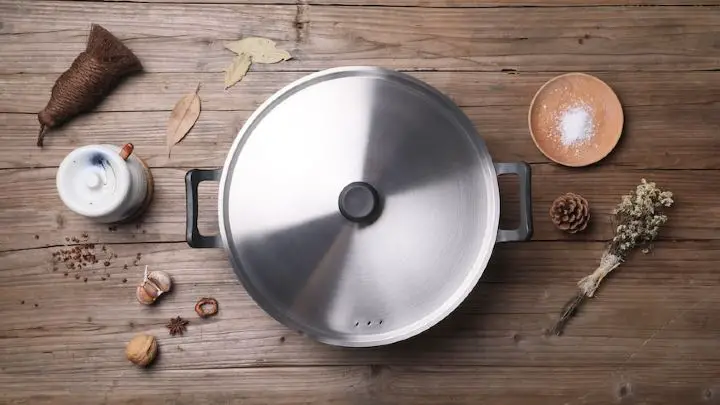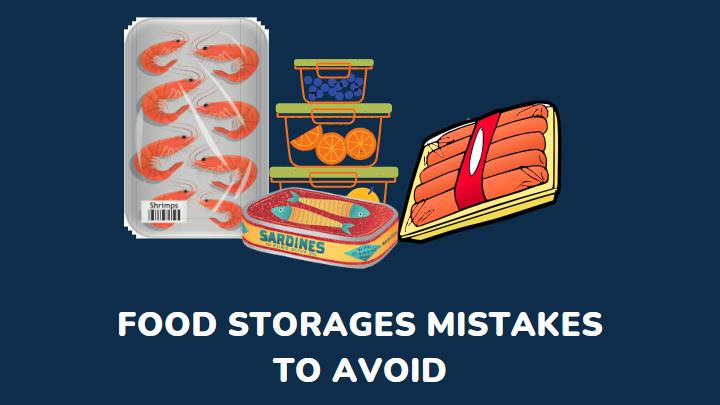Cooking your food well is as important as preserving your food well. To make the most of your cooking, you should avoid these food storage mistakes if you prioritize your food’s taste, kitchen hygiene, and overall health.
Although being too careful can cost you some ease with your kitchen lifestyle, being carefree is worse. However, balancing both takes intuition and perception.
Your observational skills in noticing things early, placing ingredients in the right container, or preserving food for a recorded time would save you.
Yes, a little step like compartmentalizing your fridge can also go a long way. Similarly, separating your vegetables would help preserve some of them longer.
So what food storage mistakes should you avoid in your kitchen? Find out in this article.
1. Putting your cookware in the fridge
It is bad to place your cookware in your fridge. This happens most times as a result of an oversight or negligence. It is wrong and should be avoided.
Refrigerating cookware, empty or with food, could damage them. The material your cookware is made of cannot withstand the temperature in the refrigerator.
As a cook aspiring to be the best chef, one of the worst things you could do is to make the mistake of placing your plates and cookware with food directly into your fridge.
Your pots are not airtight containers. Refrigerating food in them will expose the food to air and contamination.
Also, cookware is made from materials like aluminum, steel, and ceramic. These leached chemicals from these materials can contaminate your food during refrigeration.
Additionally, refrigerating your cookware reduces its lifespan. They are not designed or made to preserve food in fridges.
Plastic storage bags, containers, and Ziploc bags are made for that purpose. So, introduce these forms of storage and save the extra bill of changing your cookware after they are damaged.

2. Storing spices and oil near heat
Spices and oil should be stored far away from heat sources – stove, oven, and sunlight. Oils, especially delicate ones, become rancid and smell foul when they come in direct contact with heat.
This mistake occurs most of the time when you are about to prepare a dish. To avoid this, be attentive and highly conscious. Keep all spices and oil on a counter far away from heat.
Significantly, the cupboards where you keep your spices and oil should be far away from any source of heat. The best temperature to store them is room temperature.
3. Storing raw and cooked food together
One of the many food storage mistakes you should avoid is storing cooked foods together with raw foods. If you are storing both in the fridge, separate them. Otherwise, your food will end up contaminated.
Bacterial contamination between both foods is very likely even if they are in storage bags.
Raw foods like meat and fish should be stored properly in sealed bags to ensure that liquid from them does not affect cooked food like bread.
Also, odorous foods like onions, garlic, and ginger should be stored in airtight containers, and far away from cooked food.
4. When you are not sure, trash it
This makes the list of the common food storage mistakes people can hardly avoid. If you find yourself always trying to salvage food because you’re not sure…you’re not alone.
While it looks like you’re trying to spend wisely, you also shouldn’t risk your taste buds and health. If you are not sure, trash it.
Do not hesitate or try to taste it to see if the food is spoiled or not. This could make you lose your good taste buds.
You will subsequently feel that other foods are bad because you ate spoiled food. Instead of tasting the food, smell it and examine the physical appearance for signs of spoilage.
5. Storing fresh food for a long time
The idea of storing fresh foods to make sure that the freshness sticks for as long as possible could be a bit tricky. In reality, no matter how fresh a portion of food is, it will lose its freshness if it stays too long in the freezer.
There is no perfect manual as to how long you should store fresh foods. All you need to know is that you should not store them for long. This also applies to the fridge and freezer.
Generally, the type of food you’re storing will determine how long you store it.
For instance, raw meats cannot stay too long after it has been frozen. You should use it up within two weeks of freezing. The same goes for eggs and bread. A long-time frozen bread will never taste as well as when freshly baked.
6. Keeping anything and everything in the drawers
Although it sounds inconsequential, one of the many food storage mistakes people make is putting just anything and everything in the kit hen drawers.
There is this belief that drawers are meant to store anything in the kitchen. Kitchen drawers are specifically made to keep foods at low temperatures. They are not for your wares or plates. Surprised?
Drawers are food protectors. They keep raw food items warm in harsh weather conditions and protect them from insects or pest infestations.
Spices and seasonings are best stored in the drawers. Tubers should not be stored in drawers. The heat from the drawer will make them get soft and rotten quickly.
7. Freezing everything
Honestly, not all foods should go into the freezer. Yes, there are some foods you can freeze and there are foods you should never freeze.
Not all food items can tolerate the temperature in the freezer. Some will lose their quality when they thaw and become unusable.
8. Storing dry foods just anywhere
When next you go shopping, remember to get storage bags and plastic containers. You will need them to keep the food.
Plastic containers are the perfect options for dry food. Dry foods are not vulnerable to reactions from plastic containers; this is why they are best kept in dry containers.
Never try this for other food items, you will end up wasting the food even after preserving it.
9. Take care of high-risk foods
Among your foods, some should take the top place on your priority list. These foods are prone to food bacteria which will also spread to other foods.
Some such foods are mousse, fish, meats, milk, salads, hams, seafood, hams, and salads. These foods require extra care when preserving. You should be very careful with them.
Extreme heat and over-freezing will trigger spoilage in these foods.
10. Storing perishables wrongly
Most cooks are fond of placing perishables by the door of the fridge. This will only make your perishable get less frozen and spoil quickly.
If you cannot place it into the fridge probably because there is no space, you must consume it immediately rather than placing it by the door of the fridge.
Fridges are manufactured in a way that only the main space gets the bulk of the freezing power while the door region takes a little.
Foods stored on that side will freeze slowly unlike the main storage space where the major freezing happens.
11. Leaving your food uncovered
Whether on your countertop or in the fridge, always cover your food. This not only prevents air from getting into your food, but it also prevents bacteria, dust, or germs from contaminating already-cooked food.
And for fresh foods like fruits that are left open, wash them before eating. As easy as picking an apple up and eating it sounds, always let it run under flowing water before taking a bite.
In addition, storing food – raw or cooked – without covering it will encourage bacterial growth. Containers like Tupperware, Ziplocs, or mason jars are excellent for preserving food in airtight casings.
12. Storing onions and dry fruits together
Do not throw your onions, potatoes, and dry fruits in the same basket. They have different lifespans and once one starts to go bad, it affects every other.
Therefore, to preserve your foods, especially onions, and potatoes, preserve them separately.
Additionally, never place dry fruits and vegetables in the same basket or bowls. The smell can blend and affect the taste of your fruits, leading to spoilage.
FAQs
What will happen if you do not store your food properly?
They will spoil. This means a shortened span or just going bad from exposure. You need to preserve and store your foods to prevent them from going bad faster than they should.
When should you throw stored food away?
Throw food out immediately if you notice any sign of spoilage. On the other hand, you can also use it up, at once, if you think you can. That is, you must be sure that it is not going bad.
If it can be remade into another dish, use your creative skill to whip up another meal. For instance, leftover pasta and leftover meatloaf can be revived into fresh and tasty meals.
However, this does not mean you should use bad ingredients or food. If the food is beyond salvaging, please trash it.
How long should you store perishable food?
As long as they are good. Raw perishable foods do not last more than a week, and therefore, should be used within that window.
Meanwhile, cooked perishable foods in a cooler, not a refrigerator, can only last a day or two.
Therefore, use your perishable foods within these periods to prevent spoilage and waste.
Conclusion
For a cleaner and better cooking record, there are food storage mistakes you should avoid. Never overlook keeping your food items well, it is your kitchen duty and obligation.
Moreover, for the good of your health and pocket. Eating spoiled food puts you at risk of food poisoning and makes you spend more.
Make it a daily responsibility to check the conditions of your food. This way, you can also check for the storage mistakes you’re making with your food items.
Look at these effective methods you should use to keep food warm for your next party.
Thanks for reading.
